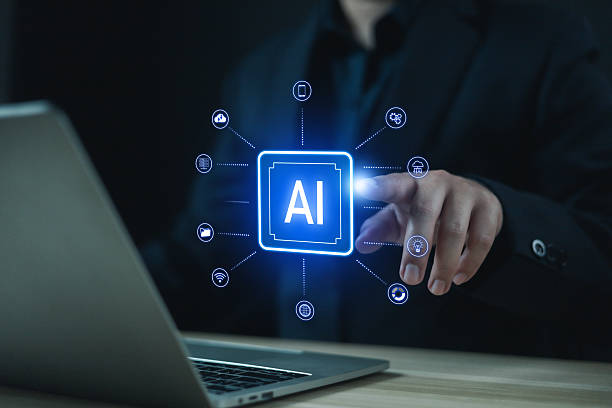Introduction to the world of mobile AI applications and their applications
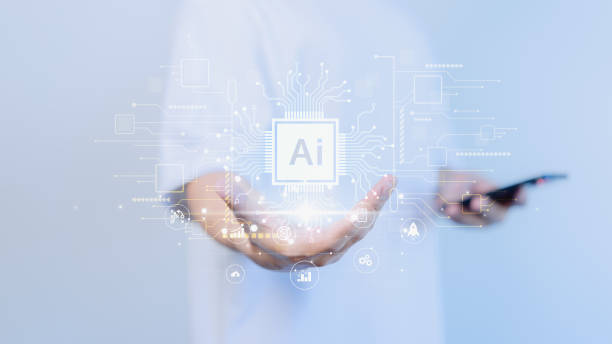
The Amazing World of Mobile AI Applications
Artificial intelligence (AI) is rapidly infiltrating various aspects of our lives, and mobile phones, as one of the main communication tools, host a wide range of AI-based applications.
Mobile AI applications use machine learning algorithms, natural language processing, and computer vision to perform complex tasks that were previously only possible by humans.
These applications are used in various fields such as improving productivity, entertainment, education, and even healthcare.
Common uses of mobile AI applications include:
- Voice assistants such as Siri and Google Assistant that use natural language processing to respond to user voice commands and perform tasks such as setting reminders, playing music, and sending messages.
- Translation applications that use machine learning to translate text and speech instantly into different languages.
For example, Google Translate is one of the most popular translation applications. - Image recognition applications that use computer vision to identify objects, faces, and scenes in images.
These applications are used in fields such as security, marketing, and education. - Content personalization applications that analyze user behavior and preferences to provide content tailored to them.
These applications are used in fields such as social networks, music, and video.
In this article, we will comprehensively examine mobile AI applications, their types, uses, advantages, and disadvantages, and provide guidance for choosing the best application to suit your needs.
Did you know that 94% of first impressions of a company are related to its website design?
Rasaweb helps you create the best first impression by providing professional corporate website design services.
✅ Creating a professional and trustworthy image of your brand
✅ Easier attraction of potential customers and improved online presence
⚡ Get free corporate website design consultation
Types of mobile AI applications: categories and features

Categorizing Mobile AI Applications
Mobile AI applications can be divided into different categories based on the type of task they perform.
Some of the most important categories include:
- Voice Assistant Applications These applications use Natural Language Processing (NLP) to understand and respond to user voice commands.
Examples in this category include Siri (Apple) and Google Assistant (Google). - Image Processing Applications These applications use Computer Vision to analyze images and extract useful information from them.
Applications in this category include facial recognition, object recognition, and image quality improvement. - Language Translation Applications These applications use Machine Learning to translate text or speech from one language to another.
Google Translate is a prime example of this category. - Prediction and Recommendation Applications These applications use data analysis to identify patterns and provide recommendations to the user.
Examples in this category include movie and music suggestions, weather forecasting, and purchase recommendations. - Health and Fitness Applications These applications use mobile sensors and AI algorithms to track user physical activity and provide solutions for improving health and fitness.
Each of these categories has its own unique features and capabilities that should be considered when choosing the right mobile AI application.
Advantages and disadvantages of using mobile AI applications
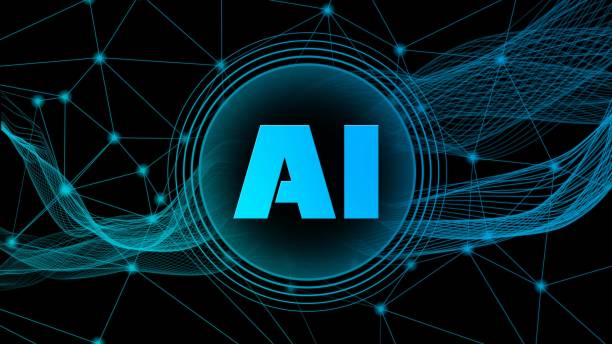
Advantages and Disadvantages of Mobile AI Applications
Using mobile AI applications has numerous advantages and disadvantages, which we will discuss below:
Advantages
- Increased Productivity These applications help users do their jobs faster and more accurately by automating tasks and providing fast and accurate information.
- Personalization of User Experience These applications personalize the user experience by analyzing user behavior and preferences and providing content tailored to them.
- Easy Access to Information These applications make access to information easier and faster by using voice assistants and smart search.
- Improved Quality of Life These applications help improve the user’s quality of life in various areas such as health, education, and entertainment.
Disadvantages
- Privacy Concerns The collection and analysis of user data by these applications raises privacy concerns.
- Need for Internet Connection Many of these applications require an internet connection to perform their tasks.
- Potential for Error AI algorithms may sometimes make mistakes and provide incorrect information.
- Technology Dependence Excessive use of these applications can lead to technology dependence and reduced human skills.
Given the advantages and disadvantages mentioned, the use of mobile AI applications should be done with awareness and caution.
| Advantages | Disadvantages |
|---|---|
| Increased productivity | Privacy concerns |
| Personalization of user experience | Need for internet connection |
| Easy access to information | Potential for error |
| Improved quality of life | Technology dependence |
Introducing the most popular mobile AI applications this year

Top Mobile AI Applications
This year, many mobile AI applications have entered the market, which are used in various fields.
Here, we introduce some of the most popular and widely used ones:
- Google Assistant Google’s voice assistant is one of the most popular AI applications that helps you do your tasks using voice commands.
This application is able to answer your questions, set reminders, play music, and control smart home devices. - Microsoft Pix is a smart camera application that uses AI to select the best settings for photography and improve image quality.
- ELSA Speak is an English language learning application that uses AI to evaluate your pronunciation and provide detailed feedback to improve it.
- Replika is a chatbot application that uses AI to converse with you and help you express your feelings and cope with stress.
- YouCam Makeup is a virtual makeup application that uses AI to analyze your face and allow you to try out various makeup styles.
These applications are just examples of the wide range of mobile AI applications available to users.
You can choose the right application based on your needs and preferences.
Does your current website display your brand’s credibility as it should? Or does it scare away potential customers?
Rasaweb, with years of experience in designing professional corporate websites, is your comprehensive solution.
✅ A modern, beautiful website that matches your brand identity
✅ A significant increase in attracting leads and new customers
⚡ Contact Rasaweb now to receive a free corporate website design consultation!
A guide to choosing the best mobile AI application to suit your needs

Choosing the Right Mobile AI Application
Choosing the right mobile AI application depends on your needs and preferences.
Here are a few key points to consider when choosing an application:
- Identify needs First, you need to specify what you expect from an AI application and what tasks you want to do with it.
- Review features Compare the different features of the applications with each other and choose an application that has the features you need.
- Read user reviews Read other users’ reviews about the applications to learn about their experience.
- Free Trial If possible, try the free version of the application before purchasing it to make sure it works.
- Pay attention to privacy Before installing the application, check its privacy policy to ensure that your information is properly protected.
By following these tips, you can choose the right mobile AI application and enjoy its benefits.
For example, if you are looking to learn a language, ELSA Speak is a good option.
The impact of mobile AI applications on various industries
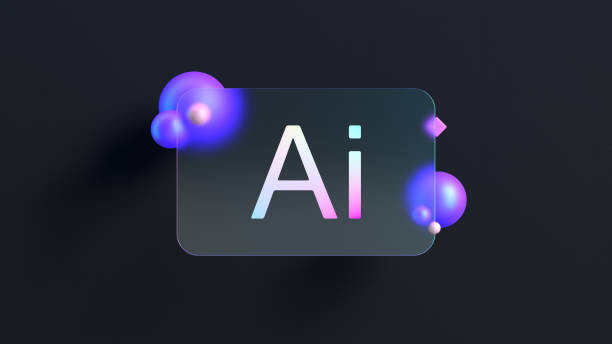
The Impact of Mobile AI Applications on Various Industries
Mobile AI applications have had a significant impact on various industries.
Some of the most important of these effects are:
- Healthcare AI applications are used in diagnosing diseases, providing medical advice, and managing medications.
These applications can help doctors make more accurate diagnoses and help patients access better care. - Education AI applications are used in teaching languages, mathematics, and other subjects.
These applications can help students learn in a personalized way and help teachers teach more effectively. - Business AI applications are used in marketing, sales, and customer service.
These applications can help businesses better understand their customers and provide them with better services. - Transportation AI applications are used in self-driving, routing, and traffic management.
These applications can help reduce traffic accidents and improve transportation efficiency.
Given these effects, it can be said that mobile AI applications play an important role in transforming various industries.
What should we expect from the future of mobile AI applications

The Future of Mobile AI Applications
The future of mobile AI applications is very bright and full of potential.
As technology advances, these applications are expected to become more powerful, smarter, and more practical.
Some of the expectations that can be had from the future of these applications include:
- Increased Accuracy and Efficiency AI algorithms are improving day by day and the accuracy and efficiency of mobile AI applications will also increase.
- More Personalization These applications will be able to more accurately understand the user’s needs and preferences and provide a personalized user experience.
- Integration with Other Devices These applications will work seamlessly with other smart devices such as smartwatches, smart TVs, and Internet of Things (IoT) devices.
- Expansion of Applications The applications of mobile AI applications will expand to new fields such as Augmented Reality (AR), Virtual Reality (VR), and the Metaverse.
Given these expectations, it can be said that mobile AI applications will play a more important role in our daily lives.
| Features | Description |
|---|---|
| Increased accuracy and efficiency | Ongoing improvement of AI algorithms |
| More personalization | More accurate understanding of user needs and preferences |
| Integration with other devices | Seamless operation with smart devices |
| Expansion of applications | Expansion to AR, VR, and Metaverse |
Challenges and limitations of developing mobile AI applications

Challenges and Limitations in Developing Mobile AI Applications
Alongside the many advantages, the development of mobile AI applications faces numerous challenges and limitations.
Some of these challenges include:
- Hardware Limitations Mobile phones have hardware limitations such as processing power and memory, which makes the development of complex AI applications difficult.
- Energy Limitations Running heavy AI algorithms consumes a lot of energy, which can reduce the battery life of the mobile phone.
- Privacy Issues Collecting and using user data to train AI models raises privacy issues.
- Lack of Experts The lack of experts in the field of artificial intelligence makes the development of AI applications difficult.
To overcome these challenges, research and development are needed in various fields such as low-power AI algorithms, privacy-preserving methods, and training AI experts.
Did you know that 94% of first impressions of a company are related to its website design?
Rasaweb helps you create the best first impression by providing professional corporate website design services.
✅ Creating a professional and trustworthy image of your brand
✅ Easier attraction of potential customers and improved online presence
⚡ Get free corporate website design consultation
Important tips for mobile AI application developers

Key Tips for Mobile AI Application Developers
To develop successful mobile AI applications, developers should pay attention to the following points:
- Choosing the Right Algorithm Choosing the right AI algorithm depends on the type of task the application must perform.
Different algorithms have their own advantages and disadvantages. - Performance Optimization In order for the application to work well on mobile phones with limited processing power, its performance must be optimized.
This can be done using techniques such as reducing model size, using low-power algorithms, and running calculations in parallel. - Privacy Preservation Developers must respect the privacy of users and refrain from collecting and using their data without their consent.
They can use methods such as Federated Learning to train AI models without direct access to user data. - Testing and Evaluation Before releasing the application, it should be thoroughly tested and evaluated to ensure that it works correctly.
This can be done using different datasets and real-world scenarios.
By following these tips, developers can develop high-quality and functional mobile AI applications.
Frequently asked questions about mobile AI applications
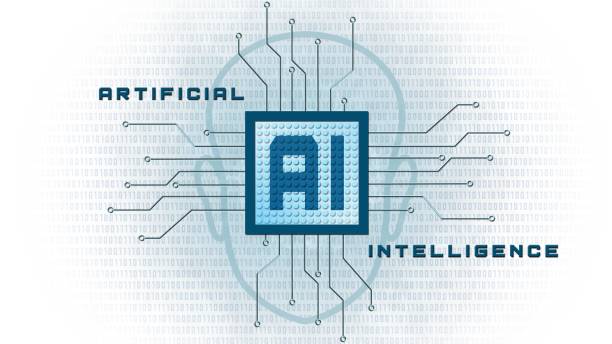
Answering Frequently Asked Questions about Mobile AI Applications
In this section, we answer some frequently asked questions about mobile AI applications:
Question: Are mobile AI applications safe?
The security of mobile AI applications depends on various factors, including how user data is collected and used, how AI algorithms are implemented, and how the application is protected against cyber attacks.
To ensure the security of the application, it should be downloaded from reputable sources and its privacy policy should be carefully reviewed.
Question: Are mobile AI applications free?
Some mobile AI applications are free, but many require payment.
Free applications usually have limitations, and to access the full features, the paid version must be purchased.
Question: How can I develop a mobile AI application?
To develop a mobile AI application, you need knowledge and skills in areas such as artificial intelligence, mobile programming, and user interface design.
You can use online training courses and specialized books to learn these skills.
Question: What impact will mobile AI applications have on our lives?
Mobile AI applications have the potential to improve our lives in various fields such as healthcare, education, business, and transportation.
However, the challenges and limitations associated with the development and use of these applications must also be considered.
FAQ
| Question | Answer |
|---|---|
| What is a mobile AI application? | It is software that uses artificial intelligence technologies (such as machine learning, natural language processing, computer vision) on a mobile device to perform tasks, personalize the user experience, or automate processes. |
| Name a few examples of these applications? | Voice assistants (such as Siri, Google Assistant), facial recognition programs, smart keyboards, photo editors with AI capabilities, and translation applications. |
| What are the benefits of mobile AI applications? | Enhancing user experience, personalizing services, automating tasks, improving accessibility, and providing offline capabilities for some AI features. |
| What are the challenges in developing these applications? | Limitations of processing power and battery life of mobile devices, data privacy concerns, optimizing the size of AI models, and the need for constant updates. |
| How do these applications process data (on device or in the cloud)? | Some process locally (on the device) for speed and privacy, others send data to the cloud for processing, and often a hybrid approach is used. |
| What technologies are commonly used in them? | Machine Learning (ML), Deep Learning (DL), Natural Language Processing (NLP), Computer Vision (CV), and Speech Recognition. |
| What impact do they have on everyday life? | Simplifying tasks, improving communication, increasing entertainment, providing personalized recommendations, and helping to live smarter. |
| What is “edge AI” in the context of mobile? | It refers to running AI models directly on the mobile device (at the “edge” of the network) instead of sending data to a central cloud server. |
| What is the future trend for these applications? | More powerful on-device AI, deeper integration with augmented reality (AR), hyper-personalization, and greater emphasis on ethical AI and privacy. |
| Are mobile AI applications always online? | No, many modern applications use on-device AI for core capabilities that allow them to operate offline or with limited connectivity, although some features may require internet. |
And other services of Rasa Web Advertising Agency in the field of advertising:
Intelligent custom software: A creative platform to improve digital branding with attractive UI design.
Intelligent reportage: A fast and efficient solution to increase website visits with a focus on Google Ads management.
Intelligent content strategy: An innovative service to increase campaign management through custom programming.
Intelligent direct marketing: A fast and efficient solution for user interaction with a focus on SEO-driven content strategy.
Intelligent brand identity: Designed for businesses looking for digital branding through the use of real data.
And more than hundreds of other services in the field of internet advertising, advertising consulting, and organizational solutions:
Internet Advertising | Advertising Strategy | Advertising Reportage
Resources
Best AI Applications
,Applications of Artificial Intelligence in Everyday Life
,Overview of AI Applications
,What is Artificial Intelligence, its Applications and Future
? For the rise of your business in the digital world, Rasaweb Afarin Digital Marketing Agency smoothes the path of your growth and success by offering comprehensive services including professional website design, SEO optimization, and social media management.
📍 Tehran, Mirdamad Street, next to the Central Bank, South Kazeroun Alley, Ramin Alley, No. 6



